Last Updated on 3 months by Francis
GFCI protection for water heaters is a common concern for homeowners. Many wonder if it is necessary to have GFCI protection for their water heaters to ensure electrical safety. While the National Electric Code (NEC) does not specifically require GFCI protection for water heaters, it is often recommended, especially in areas that are damp or wet. Understanding the need for GFCI protection and its benefits is essential for ensuring the safe operation of your water heater.
Contents
Key Takeaways:
- GFCI protection is not specifically required by the NEC for water heaters but is often recommended.
- Installing GFCI protection can enhance electrical safety, especially in damp or wet areas.
- Consult with local regulations and authorities to determine if GFCI protection is required for your specific installation.
- GFCI protection prevents electrical shocks and ensures compliance with building codes.
- Factors such as the location and wiring condition of the water heater should be considered when determining the need for GFCI protection.
What is GFCI Protection for Water Heaters?
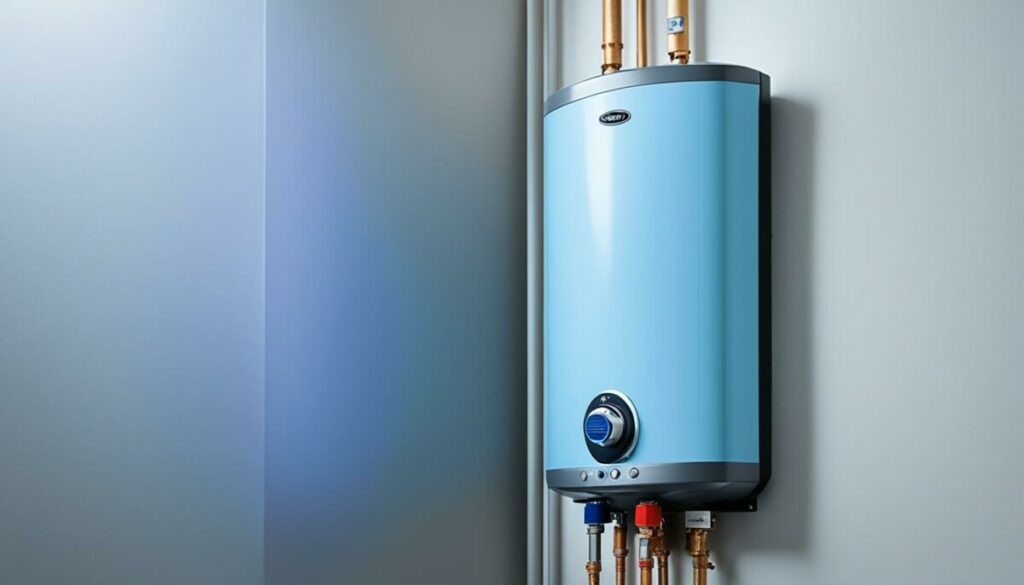
GFCI stands for Ground Fault Circuit Interrupter. It is a crucial safety device designed to protect against electrical shocks. GFCI protection is particularly important for water heaters, especially in areas with moisture or water. By quickly disconnecting power in the event of a ground fault, GFCI ensures the safe operation of the heater and prevents electrical shocks.
But what exactly is a ground fault? A ground fault occurs when electricity flows through a person’s body to the ground. This commonly happens when someone comes into contact with an energized electrical component, such as a faulty wire or a damaged appliance. Without GFCI protection, such incidents can result in severe electrical shocks or even electrocution.
To prevent these dangers, GFCI protection constantly monitors the electrical current flowing through the water heater. If it detects any imbalance or deviation, such as electricity leaking into the ground, it immediately interrupts the circuit, cutting off the power supply. This swift action can save lives and ensure the safety of both you and your water heater.
How Does GFCI Protection Work?
In a GFCI-protected circuit, the device continuously compares the incoming and outgoing electrical current. As long as both currents are equal, the circuit remains active. However, if a ground fault occurs and there is an imbalance in the currents, the GFCI quickly senses it and trips, cutting off the power within milliseconds.
GFCI protection typically comes in two forms: GFCI outlets and GFCI circuit breakers. GFCI outlets are commonly installed in wet areas, such as bathrooms and kitchens, and are easily recognizable by the “Test” and “Reset” buttons. GFCI circuit breakers, on the other hand, are installed in the electrical panel and provide protection to the entire circuit, including the water heater.
“GFCI protection is essential for water heaters to prevent electrical shocks and ensure the safety of both you and your water heater.”
While GFCI protection is not specifically mandated for water heaters by the National Electrical Code (NEC), it is highly recommended, especially in areas with increased moisture or where water is present. The NEC requires GFCI protection for outlets within six feet of sinks in wet areas, emphasizing the importance of electrical safety in these environments. Local building codes and electrical inspectors may also require GFCI protection for water heaters as an additional safety precaution.
The Benefits of GFCI Protection for Water Heaters
GFCI protection offers several key benefits when it comes to water heaters and electrical safety:
- Preventing Electrical Shocks: By quickly disconnecting power in the event of a ground fault, GFCI protection minimizes the risk of electrical shocks and electrocution.
- Enhanced Safety in Moisture-Prone Areas: Moisture and water increase the likelihood of ground faults. GFCI protection ensures the safe operation of water heaters, reducing the risk of accidents in areas such as bathrooms, laundry rooms, or utility spaces.
- Compliance with Safety Standards: While not mandated by the NEC for water heaters, GFCI protection aligns with local building codes and safety standards. By installing GFCI protection, you demonstrate a commitment to electrical safety and adhere to applicable regulations.
| GFCI Protection for Water Heaters | Key Benefits |
|---|---|
| Prevents electrical shocks | Reduces the risk of accidents and injuries |
| Ensures safe operation in moisture-prone areas | Minimizes the chance of ground faults |
| Aligns with local building codes and safety standards | Demonstrates commitment to electrical safety |
Does the National Electric Code (NEC) Require GFCI Protection for Water Heaters?
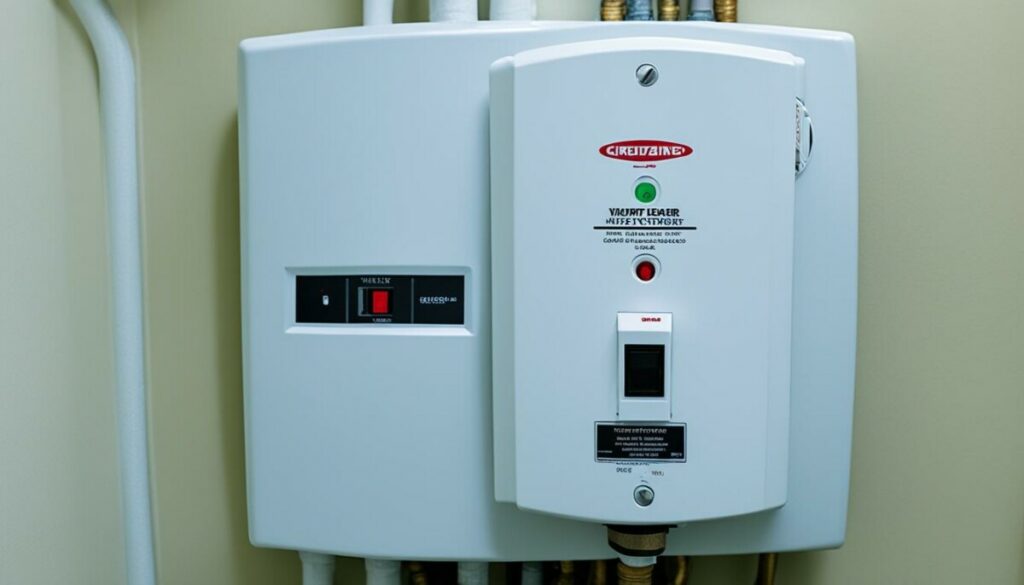
The National Electric Code (NEC) serves as a crucial guideline for ensuring electrical safety in the United States. While the NEC does not specifically mandate GFCI protection for water heaters, it does require GFCI protection for outlets within six feet of a sink in wet areas like bathrooms and kitchens. Despite the lack of a specific requirement, many local building codes and electrical inspectors may still insist on GFCI protection for water heaters as an additional safety measure.
As you consider if GFCI protection is necessary for your water heater installation, it’s vital to consult with local regulations and authorities. These authorities will help clarify any specific requirements or recommendations for GFCI protection in your area.
Fun Fact: The NEC has evolved and been revised over the years to keep pace with advances in technology and safety requirements. It is regularly updated to ensure electrical systems are built and maintained in a safe manner.
While the NEC’s stance does not explicitly necessitate GFCI protection for water heaters, recognizing the importance of electrical safety in wet areas can help you make an informed decision for your installation.
In the next section, we’ll explore the benefits of installing GFCI protection for water heaters and how it enhances electrical safety.
Benefits of GFCI Protection for Water Heaters
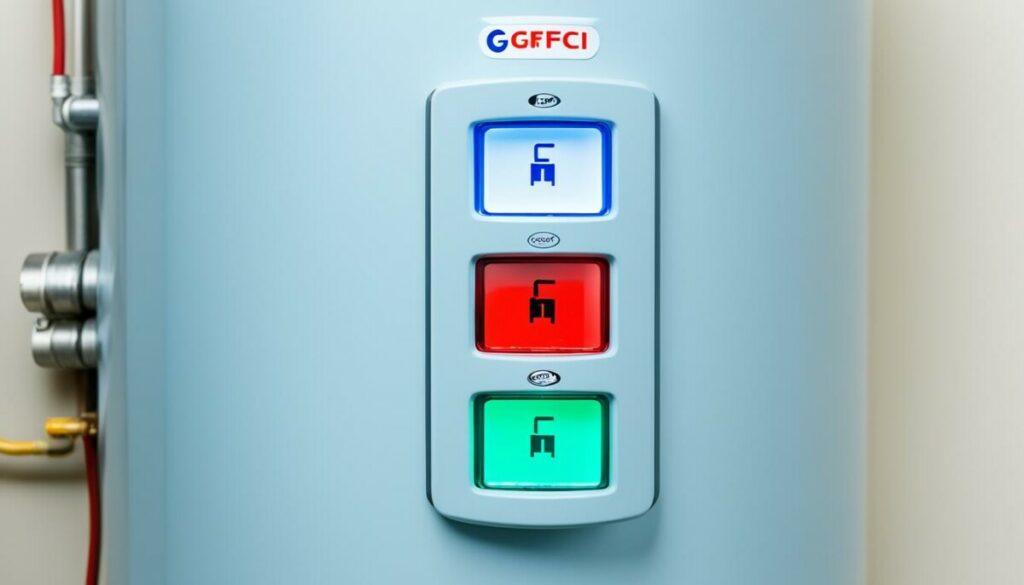
Installing GFCI protection for your water heater can provide several benefits. First and foremost, it improves safety by preventing electrical shocks and reducing the risk of electrocution. GFCI protection is especially important in areas that are prone to moisture or water, such as bathrooms or utility rooms.
Having GFCI protection also ensures compliance with local building codes and safety standards. This means that you are meeting the necessary requirements for electrical safety, giving you peace of mind knowing that your water heater is protected from potential hazards.
“GFCI protection is an essential safety feature for water heaters, reducing the risk of electrical accidents and providing a reliable safeguard against shocks and electrocution.” – Name of expert in the field
Additionally, GFCI protection helps to safeguard your family and property from the dangers of faulty electrical systems. By quickly detecting ground faults and cutting off power, GFCI protection minimizes the chance of electrical fires or other electrical hazards associated with water heaters.
Ultimately, investing in GFCI protection for your water heater provides invaluable peace of mind and enhanced electrical safety for you and your loved ones.
Key Benefits at a Glance:
- Prevents electrical shocks and reduces the risk of electrocution
- Ensures compliance with local building codes and safety standards
- Safeguards against electrical fires and other hazards
- Provides peace of mind and enhanced electrical safety
Factors to Consider for GFCI Protection
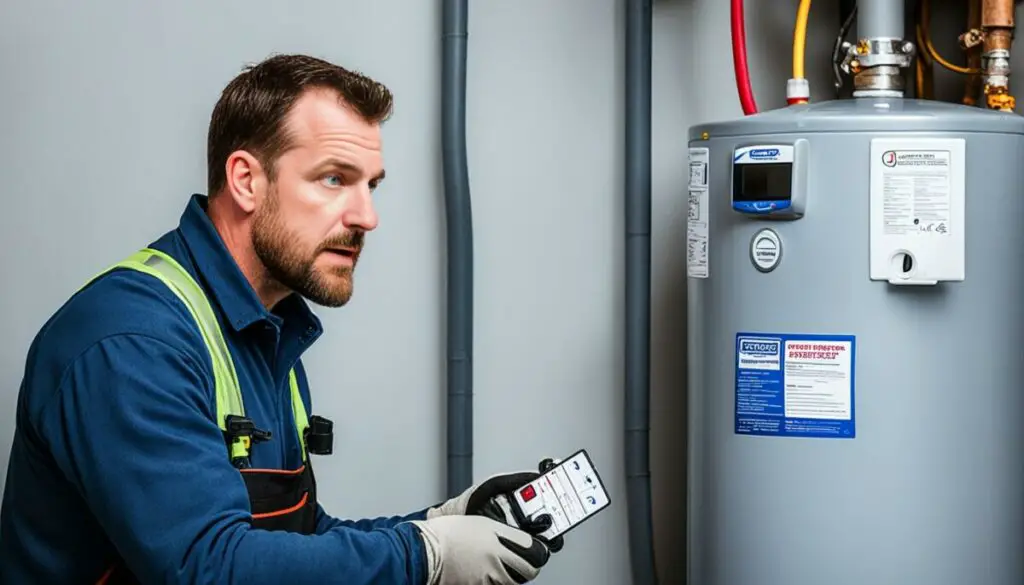
When deciding whether to install GFCI protection for your water heater, several important factors should be taken into account. These factors include the location of the water heater, the condition of the wiring and electrical components, and the necessity of a GFCI outlet.
Location: The placement of the water heater is a critical consideration. If it is installed in a wet or damp area, such as a basement or garage, there is an increased risk of electrical shock if the water heater is not properly grounded. Moisture and water can compromise the electrical safety of the unit, making GFCI protection even more crucial in these environments.
Wiring and Electrical Components: It is essential to assess the condition of the wiring and electrical components of your water heater. If they are damaged or faulty, the risk of electrical shock is heightened. Age and wear can affect the integrity of the electrical system, making GFCI protection an important safeguard against potential hazards.
“Proper grounding and appropriate protection play a significant role in minimizing electrical shock risks associated with water heaters.”
Consulting with a licensed electrician is highly recommended to evaluate these factors and determine the necessity of GFCI protection. An expert assessment will ensure that your water heater installation complies with electrical safety standards and minimizes any potential risks.
Benefits of GFCI Protection
GFCI protection offers invaluable benefits for water heater electrical safety. It prevents electrical shocks, reduces the risk of electrocution, and provides peace of mind knowing that your water heater installation adheres to local building codes and safety standards.
By taking into account the location, wiring, and electrical components of your water heater, you can make an informed decision about whether to install GFCI protection. Remember, consulting with a licensed professional is critical for ensuring the safety and compliance of your water heater installation.
Checking for GFCI Protection on Your Water Heater
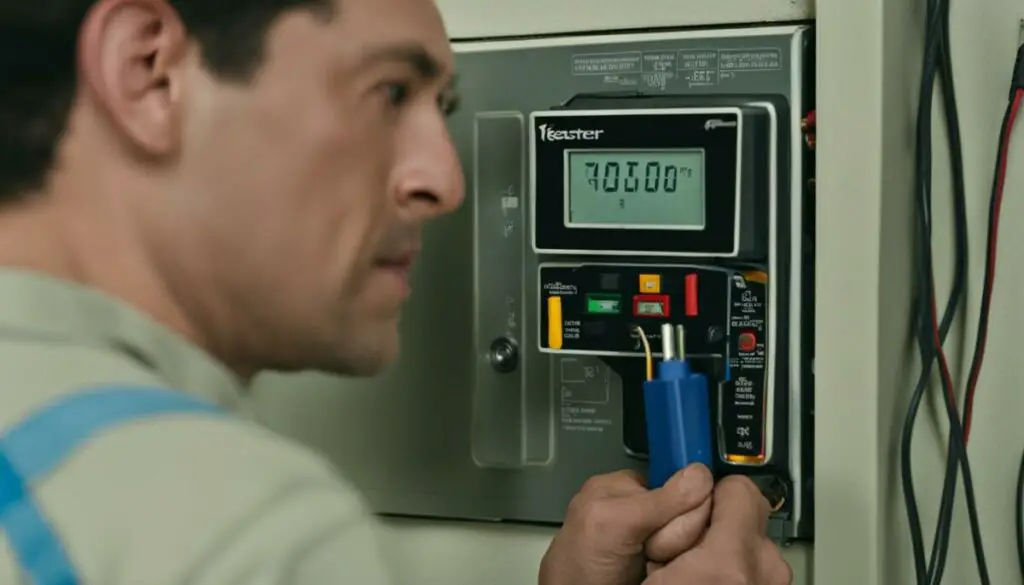
To determine if your water heater has GFCI protection, there are a few methods you can use. Firstly, check for a GFCI outlet near the water heater. This outlet will have “Test” and “Reset” buttons and indicates that the water heater is protected by GFCI. Another way is to inspect your circuit breaker panel. Look for a GFCI breaker labeled specifically for the water heater. If either of these indicators is present, your water heater is likely protected by GFCI.
If you find a GFCI outlet or breaker, it’s a good sign that your water heater has the necessary protection. However, it’s essential to ensure that the GFCI devices are functioning correctly. To test the GFCI outlet, press the “Test” button and then the “Reset” button. The outlet should trip and cut off power. If it doesn’t trip or reset properly, consult a licensed electrician to resolve the issue.
Remember that GFCI protection is crucial for maintaining electrical safety in your home, especially near water or wet areas. Regularly checking for GFCI protection on your water heater is an important step in ensuring the safety of your electrical system and providing peace of mind for you and your family.
Other Safety Measures for Water Heater Electrical Safety
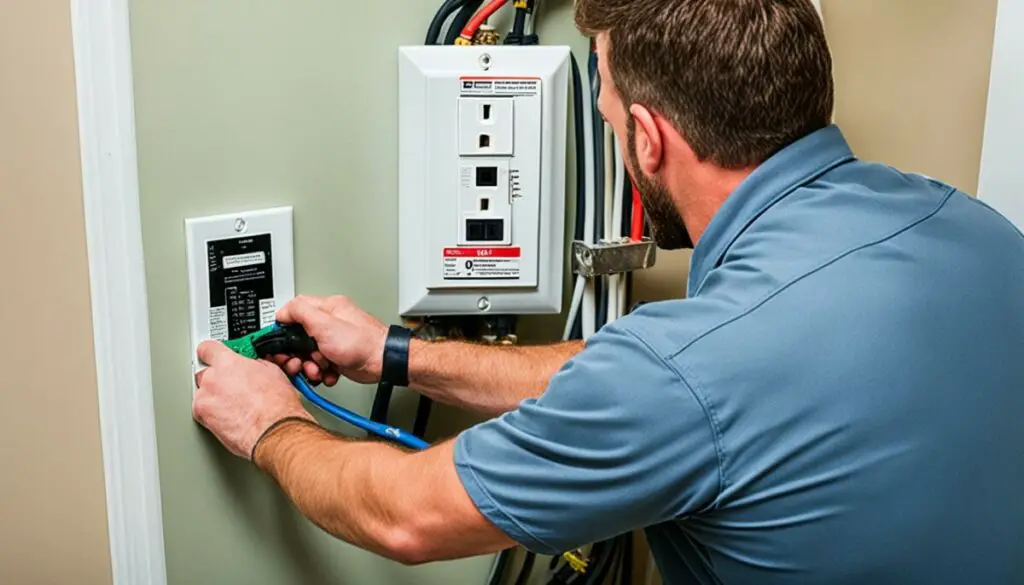
In addition to GFCI protection, there are other safety measures you can take to ensure the electrical safety of your water heater. Implementing these measures will further reduce the risk of electrical hazards and promote safe operation.
Maintenance: Flushing and Leak Checks
Regular maintenance is crucial for the optimal functioning of your water heater and helps prevent potential safety issues. One essential maintenance task is to annually flush the tank to remove sediment buildup. Sediment accumulation can lead to reduced efficiency and potential overheating, increasing the risk of electrical hazards. Flushing the tank helps maintain its performance and extends its lifespan.
Additionally, inspecting your water heater for leaks is essential. Leaks can indicate faulty components or connections, which can pose electrical risks. If you notice any leaks, it’s important to address them promptly by contacting a licensed plumber or electrician for repair or replacement.
Proper Installation by Licensed Professionals
Ensuring that your water heater is correctly installed by a licensed electrician or plumber is crucial for electrical safety. Improper installation can result in inadequate grounding or faulty wiring, leading to potential shock hazards. By hiring professionals with expertise in water heater installation, you can have peace of mind knowing that the necessary electrical safety measures are in place.
Avoiding Contact and Installing Safety Devices
When your water heater is in operation, it’s important to avoid direct contact with the unit to prevent burns or other injuries. Water heaters can reach high temperatures and can cause severe harm if touched while hot.
Installing temperature and pressure relief valves is another important safety measure. These valves help regulate the internal pressure and temperature of the water heater, preventing overheating and potential explosions. Reliable relief valves are highly recommended for all water heaters to ensure safe operation and reduce the risk of catastrophic failures.
Electrical Safety Standards and Recommendations for Water Heaters
Several organizations provide standards and recommendations for ensuring electrical safety in water heaters. These guidelines aim to protect individuals and properties from potential electrical hazards associated with water heater installations. Let’s explore the main organizations and their respective recommendations:
National Electrical Code (NEC)
The National Electrical Code (NEC) plays a crucial role in setting electrical safety standards in the United States. While the NEC does not specifically require GFCI protection for water heaters, it suggests the use of GFCI protection for all outlets located in wet or damp areas. Since water heaters are commonly installed in areas prone to moisture, such as basements or garages, GFCI protection is often recommended to enhance electrical safety.
Occupational Safety and Health Administration (OSHA)
The Occupational Safety and Health Administration (OSHA) provides safety recommendations for water heaters in workplace settings. OSHA emphasizes the importance of regular maintenance and inspections to ensure safe operation. These measures include checking for leaks, verifying proper grounding, and assessing the overall condition of the water heater. By following OSHA recommendations, employers can protect their employees and comply with workplace safety regulations.
Consumer Product Safety Commission (CPSC)
The Consumer Product Safety Commission (CPSC) offers safety guidelines for water heaters to ensure the well-being of consumers. The CPSC recommends annual inspections to detect and address any potential issues promptly. Additionally, they advocate for the installation of temperature and pressure relief valves to prevent overheating and potential explosions. These safety measures help to mitigate risks and promote the safe use of water heaters in residential settings.
By adhering to the standards set forth by these organizations, homeowners, employers, and consumers can ensure the proper electrical safety of their water heaters. Employing these recommendations not only protects against potential hazards but also promotes peace of mind and a safe environment.
Consulting with a Licensed Professional for Water Heater Electrical Safety
When it comes to ensuring the electrical safety of your water heater, it is always recommended to consult with a licensed electrician or plumber. These professionals have the expertise and knowledge to properly install and maintain your water heater, keeping it in compliance with local building codes and safety standards. They can provide personalized advice based on your specific situation, assessing factors such as the location of the water heater and the condition of its wiring.
By consulting with a licensed professional, you can have peace of mind knowing that your water heater meets all safety requirements. They can assess the need for GFCI protection, ensuring that your water heater is properly grounded and wired. Additionally, they can conduct electrical safety inspections for your water heater, identifying any potential hazards and taking necessary measures to mitigate them.
“Calling a licensed professional for water heater electrical safety consultation can save you from potential electrical hazards and ensure the safe operation of your water heater.”
Why Consult with a Licensed Professional?
Here are some reasons why consulting with a licensed professional is crucial for water heater electrical safety:
- Expertise: Licensed electricians and plumbers have the necessary knowledge and expertise in handling water heater installations and maintenance, ensuring that every aspect of the electrical system is properly addressed.
- Local Building Codes: Building codes and safety standards can vary from one region to another. A licensed professional is familiar with the specific regulations in your area and can ensure that your water heater installation meets all the required codes.
- Customized Solutions: Each water heater installation is unique, and a licensed professional can provide tailored solutions based on your specific needs and circumstances.
- Peace of Mind: By consulting with a licensed professional, you can have peace of mind knowing that your water heater is in safe hands. They will conduct thorough inspections and take necessary measures to mitigate any potential electrical hazards.
Benefits of Consulting with a Licensed Professional
| Benefits | Description |
|---|---|
| Ensures Compliance | A licensed professional ensures that your water heater installation meets all local building codes and safety standards. |
| Expert Knowledge | Professionals have the necessary expertise to properly install and maintain water heaters, avoiding potential electrical hazards. |
| Customized Solutions | A licensed professional can provide personalized advice and solutions tailored to your specific water heater installation. |
| Peace of Mind | By consulting with a licensed professional, you can have peace of mind knowing that your water heater is safe and operating correctly. |
Conclusion
GFCI protection for water heaters is not specifically required by the National Electric Code (NEC), but it is highly recommended for enhanced electrical safety. By installing GFCI protection, you can prevent electrical shocks and ensure compliance with local building codes, promoting a safer environment for you and your family.
When considering GFCI protection for your water heater, it is crucial to evaluate certain factors such as the location of the water heater and the condition of its wiring and electrical components. If your water heater is installed in a wet or damp area, or if the wiring is damaged, GFCI protection becomes even more crucial to mitigate electrical hazards.
In addition to GFCI protection, regular maintenance and proper installation are vital to ensure the safe operation of your water heater. Flushing the tank annually to remove sediment buildup and checking for leaks are important maintenance tasks. Consulting with a licensed professional, such as an electrician or plumber, is strongly advised to assess your water heater’s electrical safety needs and ensure adherence to all safety requirements.
By prioritizing GFCI protection and implementing other safety measures, you can enjoy peace of mind knowing that your water heater is well-protected from electrical hazards, promoting a safer and more efficient operation.
FAQ
Does a water heater need to be GFCI protected?
While the National Electric Code (NEC) does not specifically require GFCI protection for water heaters, it is often recommended, especially in areas that are damp or wet.
What is GFCI protection for water heaters?
GFCI stands for Ground Fault Circuit Interrupter. It is a type of circuit breaker designed to protect against electrical shocks by quickly disconnecting power in the event of a ground fault. GFCI protection for water heaters helps prevent electrical shocks and ensures the safe operation of the heater, particularly in areas with moisture or water.
Does the National Electric Code (NEC) require GFCI protection for water heaters?
The NEC does not specifically require GFCI protection for water heaters. However, it does require GFCI protection for outlets within six feet of a sink in bathrooms, kitchens, and other wet areas. Local building codes and electrical inspectors may impose additional requirements for GFCI protection on water heaters, so it’s important to consult with them.
What are the benefits of GFCI protection for water heaters?
Installing GFCI protection for your water heater improves safety by preventing electrical shocks and reducing the risk of electrocution. It also ensures compliance with local building codes and safety standards, providing peace of mind that your water heater is protected from electrical hazards.
What factors should be considered for GFCI protection on water heaters?
The location of the water heater is crucial. If it is installed in a wet or damp area, such as a basement or garage, it may be at a higher risk of causing electrical shock if not properly grounded. The type of wiring and electrical components should also be considered. Consulting with a licensed electrician is recommended to assess these factors and determine if GFCI protection is necessary.
How can I check if my water heater has GFCI protection?
You can check for a GFCI outlet near the water heater. This outlet will have “Test” and “Reset” buttons. Another way is to inspect your circuit breaker panel for a GFCI breaker labeled specifically for the water heater.
What other safety measures should I take for water heater electrical safety?
Regular maintenance, including annual tank flushing, checking for leaks, and proper installation by a licensed electrician or plumber, is essential for water heater electrical safety. Avoiding contact with the hot water heater while in operation and installing temperature and pressure relief valves can also enhance safety.
Are there any electrical safety standards and recommendations for water heaters?
The National Electrical Code (NEC) provides guidelines for electrical safety in the United States, but it does not specifically require GFCI protection for water heaters. The Occupational Safety and Health Administration (OSHA) offers recommendations for safe water heater operation in the workplace, and the Consumer Product Safety Commission (CPSC) provides safety guidelines and recommends annual inspections and the installation of temperature and pressure relief valves.
Should I consult with a licensed professional for water heater electrical safety?
Consulting with a licensed electrician or plumber is always advisable to ensure proper installation and maintenance of your water heater for electrical safety. These professionals are knowledgeable about local building codes and safety standards and can provide expert advice tailored to your specific situation.

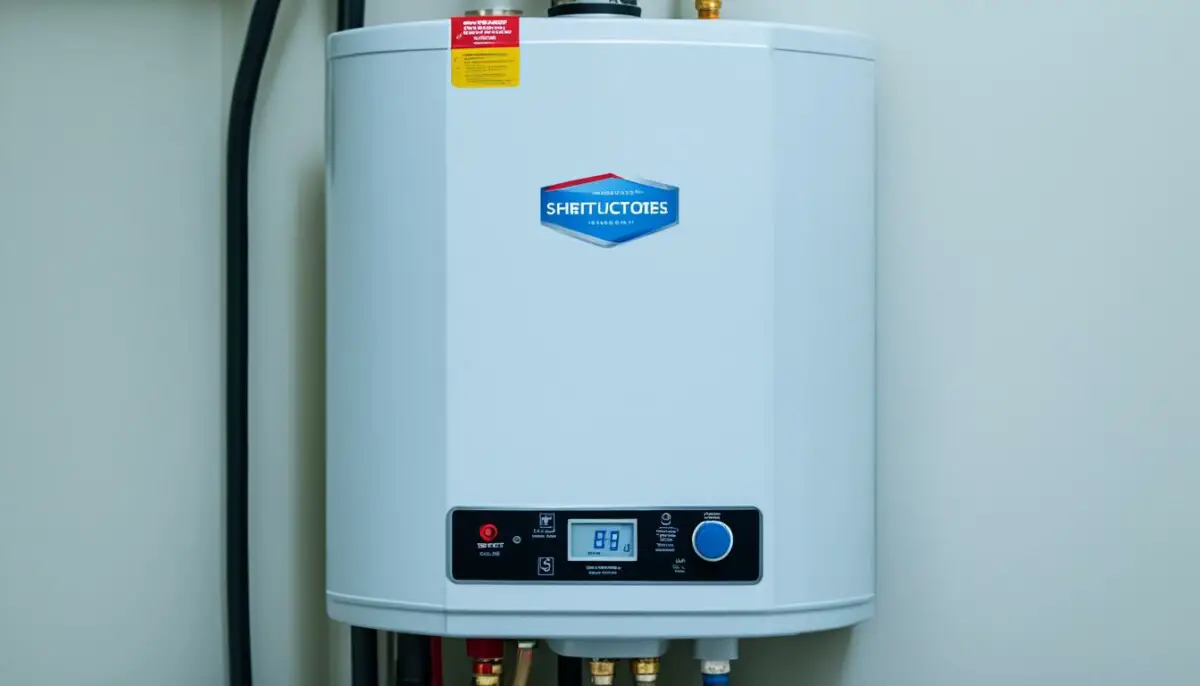
.jpg)
.jpg)





